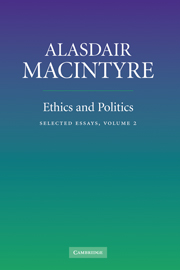Book contents
- Frontmatter
- Contents
- Preface
- Acknowledgments
- PART I LEARNING FROM ARISTOTLE AND AQUINAS
- PART II ETHICS
- PART III THE POLITICS OF ETHICS
- 8 Three perspectives on Marxism: 1953, 1968, 1995
- 9 Poetry as political philosophy: notes on Burke and Yeats
- 10 Some Enlightenment projects reconsidered
- 11 Social structures and their threats to moral agency
- 12 Toleration and the goods of conflict
- Index
12 - Toleration and the goods of conflict
Published online by Cambridge University Press: 27 January 2010
- Frontmatter
- Contents
- Preface
- Acknowledgments
- PART I LEARNING FROM ARISTOTLE AND AQUINAS
- PART II ETHICS
- PART III THE POLITICS OF ETHICS
- 8 Three perspectives on Marxism: 1953, 1968, 1995
- 9 Poetry as political philosophy: notes on Burke and Yeats
- 10 Some Enlightenment projects reconsidered
- 11 Social structures and their threats to moral agency
- 12 Toleration and the goods of conflict
- Index
Summary
WHAT QUESTIONS SHOULD WE ASK?
When ought we to be intolerant and why? I pose this question in the first instance as one concerning the ethics of conversation and especially the ethics of one particular kind of conversation. That kind of conversation occurs when a group of individuals enquire together about how it would be best for them to act, so that some good can be achieved or some evil avoided, where that good is both an individual and a common good – the good of this or that household or neighborhood, this or that workplace or school or clinic, this or that orchestra or laboratory or chess or football club. The central aim of this type of conversation is to arrive at as large a measure as possible of agreement that will issue in effective practical decision-making. But it cannot achieve this aim unless it also achieves two subsidiary aims: that of enabling those who participate in it both to give voice to their own concerns and to understand those of others, and by so doing that of framing and cataloguing the best reasons for and against each alternative course of action.
Such conversations are a feature of any flourishing form of everyday social life. They are also characteristically and not surprisingly scenes of conflict. For they are most needed when significantly different alternative possibilities in its immediate future have opened up for some particular group and when there are at least prima facie good reasons for different and incompatible courses of action.
- Type
- Chapter
- Information
- Ethics and PoliticsSelected Essays, pp. 205 - 223Publisher: Cambridge University PressPrint publication year: 2006
- 6
- Cited by



